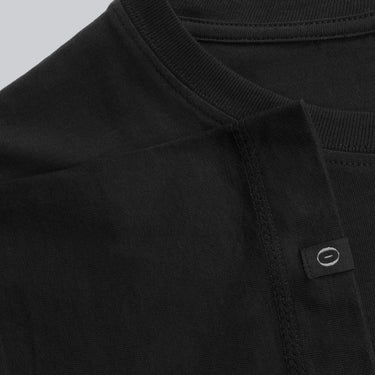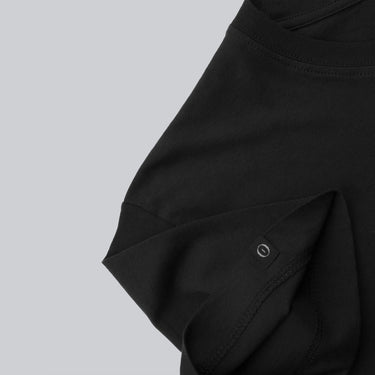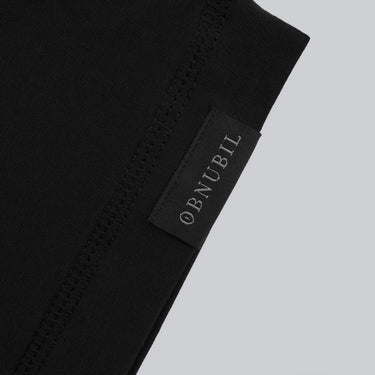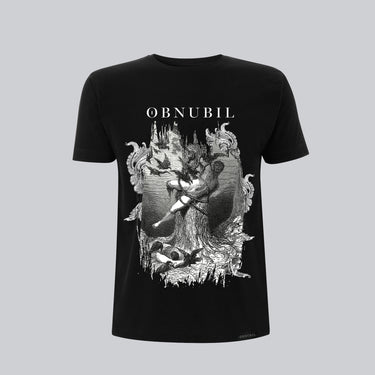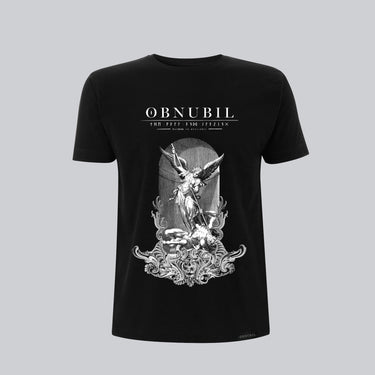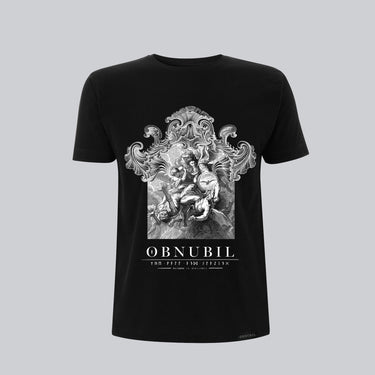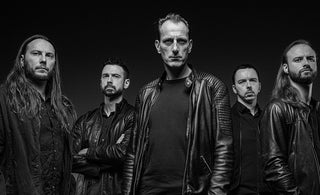
Ben Haugg, the guitarist of the German progressive death metal band Disillusion, has been an integral part of the group's evolving sound, known for blending complex musical arrangements with intense emotional depth. Disillusion has long been celebrated in the metal community for their innovative approach, fusing elements of death metal with progressive rock and cinematic soundscapes to create a unique and immersive listening experience. As a guitarist, Haugg contributes to this intricate tapestry with his dynamic playing style, seamlessly shifting from crushingly heavy riffs to more melodic and atmospheric passages, showcasing a mastery of both technical proficiency and expressive nuance. In this interview, we delve into Haugg's journey with Disillusion, exploring his influences, creative process, and the band's latest endeavors.

INTERVIEW
OBNUBIL: Can you tell us about the first time you picked up a guitar? What or who inspired you to start playing, and how did you transition into the Melodic/Progressive Death Metal genre?
BEN: My older brother had a significant influence on me back then. Unfortunately, there was little contact with music or anything like a scene, as I grew up in the countryside. It was through him that I became aware of rock and metal in the first place. I also got my first electric guitar from him. It all started classically with Metallica, Rage Against the Machine, and AC/DC, and that sparked my passion for the guitar. "10,000 Days" by Tool was my first encounter with the progressive side. Then it continued with Mastodon and Opeth until I came across the 70s prog era and bands like the Mahavishnu Orchestra during my music studies. Meshuggah also had a very groundbreaking impact on me at that time.
OBNUBIL: Disillusion was founded in 1994 by Andy Schmidt, Tobias Spier, Alex Motz, Markus Espenhain and Jan Stölzel. Back then the band played thrash metal. Right now only Andy remains and you have been part of the band since 2016. The German metal scene has a rich history and unique sound. How has growing up in Germany influenced your musical journey and the sound of Disillusion from trash to progressive?
BEN: To be honest, I don't think very much in a musical context. I only came into contact with German metal bands much later, apart from German punk bands and Accept, and even then only sparingly. The international scene actually influenced me more. Metal was always the main focus, but I also liked other styles like blues, jazz, old-school hip-hop, and various pop acts. I still enjoy these very much, and these genres have definitely had an influence on me as well.
OBNUBIL: Disillusion's sound is a complex blend of melodic and progressive elements. Who are some of your biggest influences as a guitarist, and how have they shaped your playing style?
BEN: Some of my greatest heroes are Tony Iommi, Angus Young, Dimebag Darrell, Jeff Loomis, Mike Stern, and Fredrik Thordendal. There are so many incredible guitarists out there, which makes it hard to name just a few... I also love Kurt Ballou and Joe Duplantier! They may not be classic guitar heroes, but I love their creative approach to the guitar and how they write unique and highly individual riffs. I’ve learned a lot, especially through transcriptions of songs and solos from the aforementioned artists. From every guitarist you study for a longer period, you pick up some techniques that continue to shape you.


OBNUBIL: Disillusion's compositions are known for their intricate structures and technical prowess. Can you walk us through your creative process when writing guitar parts for your songs?
BEN: The songwriting process begins with collecting ideas, usually just guitar riffs or melodies. Often, cool ideas come up while jamming or practicing certain techniques. Sometimes there are only sketches where it isn't yet clear which instrument will take on which role. We always try to compose as visually as possible. What kind of atmosphere and mood does each part or song have, and how can it progress? The visual aspect often helps more than putting it into words... We all write the songs together, but a large part of the songwriting is actually done by Andy.
OBNUBIL: Your latest album “Ayam” has been critically acclaimed. Can you discuss the inspiration behind it and how the guitar work evolved during its creation? The album was written during the isolation of the pandemic. How did you deal with that?
BEN: We were still in the final phase of the Liberation Tour when the pandemic started. The last dates and the entire summer festival season were canceled, and as a result, the album felt like it faded away rather quickly. The decision to work on new material, especially since nothing could happen live, was very clear to us. Also, a few months earlier, my daughter was born. Even though it was a tough time for many, for me personally, it was a very relaxed and productive period. Everything slowed down, and you could focus on the essentials, like songwriting and the new family life. To be honest, that aligns more with my lifestyle. And in this environment, between focusing on songwriting, the lack of options to be on the road, a new family life, and the whole global mess, most of the guitar parts and songs were created. You might even hear that emotional ambivalence in the music...
OBNUBIL: Many fans have described "Ayam" as a masterpiece in terms of songwriting and production. How did you approach the composition of the guitar parts, and were there any unexpected challenges during the recording process?
BEN: Producing a complete album is always a massive challenge, especially since the last 10-30% still happens during the actual recording process. It's a very intense but also extremely creative time. Since everyone also has a 'normal' life with family and job responsibilities, producing an album on the side is a double or even triple burden. On top of that, I also moved at that time... It was all a bit much, but the result was more than just satisfying for us! The approach to the composition was more of a standard process.
OBNUBIL: What does “Ayam” actually mean?
BEN: There are several interpretations, the most obvious being the sonic connection to "I am". Influenced by the many uncertainties like global crises, war, pandemics, and the arising questions of who I am and where I am going, the title was very fitting and a statement. I am!
OBNUBIL: Disillusion’s sound has evolved significantly since its inception. How do you feel your guitar playing has developed over the years, and what do you think has been the most significant change in the band's musical direction?
BEN: There have been many musical changes, and there will continue to be more in this band, at least in smaller forms. It is partly just the evolution of time. Different styles require different playing techniques. With Disillusion, I definitely learned different approaches compared to, for example, with my second band Caroozer or when I work on solo material.
"BTTOS" was definitely a milestone for the band in every respect back then, both compositionally and for the band's vibe and future. It remains a benchmark against which every successor is measured, a classic case of both a curse and a blessing.
OBNUBIL: How do you define the term “progressive” when it comes to your music? What makes Disillusion’s sound stand out in the crowded landscape of progressive and death metal?
BEN: For me, it has to do with unconventional songwriting. Each song develops as it needs to, not necessarily to appeal to as many people as possible. It should still always be musical, at least that's our approach to writing songs. I can only speak for what makes the band unique to me: the musical journeys that each song takes you on, the unusual soundscapes, and chord progressions. It can sometimes be challenging to connect with this type of music, but if you give it a chance, it can be very intense and beautiful.
OBNUBIL: Many fans find a philosophical depth in Disillusion’s music. How important is philosophical or existential content to your songwriting, and how does it influence your guitar compositions?
BEN: The lyrics are written exclusively by our singer. It's cool that many people see it that way, but it's not intentional, it's a natural process, just like in instrumental songwriting. Each song represents a vivid journey for us that we try to translate musically. The same goes for the guitar parts: we attempt to convey certain moods and emotions through the guitar, so that it makes sense to us and tells a story. Whether it ends up being a guitar or a triangle, like in "Tormento", or something else, will reveal itself over time. It just has to feel complete and right for us, and then it's good.
OBNUBIL: Your solos are known for their emotive power and technical precision. How do you strike a balance between emotional expression and technicality in your guitar solos?
BEN: Oh wow, thank you! I'm glad to hear that. With Disillusion, I had to find a new approach for composing solos. Sometimes I have an idea right away, and other times it takes weeks to develop the solo. Usually, the song is already quite developed, and I have to add the solo to it, developing it from a previous melody or theme, or seeing it as an introduction to a new part. I always try to get as clear a sense of the song as possible and write in a way that serves the song. I often try to incorporate various techniques or theoretical approaches that I'm currently practicing. The beginning and end of a solo are often the most important parts, at least what sticks with listeners the most. I also enjoy adding some technical flair in between. That’s what I like in other solos as well, a mix of singable melodies and technically interesting licks.
OBNUBIL: The music industry, especially in niche genres like Progressive Death Metal, can be quite challenging. What has been one of the biggest obstacles you've faced in your career, and how have you overcome it?
BEN: I think I've only just begun to get a glimpse of what it means to be on a higher level, a taste of how things really work in the business. Of course, I can only reflect on my personal impression of everything we have experienced and achieved so far. Still, I can say that, as is often the case in life, it is different from what you might imagine. I love music, and it's all I've ever wanted, but it demands an extreme amount from you. You invest an incredible amount of energy and time into the project both in everyday life and on stage. Anyone who has been on tour for a while knows what that means. Moreover, what you end up with can be more than just disheartening. My experience is that if you want to make quick money in this business, you should not be on stage. Nevertheless, I wouldn’t want to miss it.

OBNUBIL: How do you see Disillusion's music evolving in the future? Are there any new elements or directions you're excited to explore in your guitar work?
BEN: Music always involves development. Otherwise, it means stagnation, and nobody wants that ;). Of course, there are various trademarks, but there is always a process in every band, musician, and artist, I think. Our personal feelings and current listening habits always influence the band's current process. I always try to work on new techniques and improve on my instrument, incorporating that into the composition. That’s, in my opinion, the most effective way to continue developing. Blues, fusion, and jazz music are definitely a big inspiration. Openness is the key word here. This can also include very different music genres, movies, or anything else.
OBNUBIL: This year the band celebrates the 20th anniversary of the album "Back to times of Splendor". To do this, you have launched a remastered edition of the album and have also toured Germany, the Czech Republic, Switzerland and Austria. You also just came back from ProgPower in USA and next up will be a performance at the Ready For Prog 2024 in France and Skullcrusher Dresden Metal Hilft Kids 2024, a social aid initiative for kids. What other plans are in sight and when can we expect a new album?
BEN: The "BTTOS" tour was incredibly good, and we were extremely happy and grateful for how everything went. Currently, we're working on new material and preparing for the upcoming concerts. There might also be a few new gigs added. We'll see. There will be new music from us in 2025!
OBNUBIL: What do you enjoy doing when you’re not making music with Disillusion? Do you also have any other projects? Are there any hobbies or interests that your followers might be surprised to learn about?
BEN: Besides my family, music is definitely the main focus of my life. A day without guitar is a bad day. Haha. Professionally, I teach guitar. I’m also working on building my own German-language online platform as a guitar teacher. I’m currently writing many lessons that I plan to publish online. Performing live and writing music are some of the best things for me, but I also love teaching guitar. It’s the best job I’ve ever had. Additionally, I have a second band called Caroozer, which I mentioned earlier. It’s in the groove metal direction, similar to Pantera, with some Black Sabbath influences and slight thrashy elements.
OBNUBIL: If you were to create a “Guitarist's Survival Kit” with only 3 items, what would they be and why?
BEN: Guitar, amplifier, and a delay/reverb pedal! Often, that’s all you need. You can do a lot with that. A good guitar and a cool amplifier that you feel comfortable with are the most important things. With a reverb/delay pedal, you can create an immense amount of atmosphere and space. That’s enough for me, and with that, you can dive into the wonderful world of music for a long time! HAHA!
OBNUBIL: It has been a pleasure talking to you and getting to know you a little more! Thank you so much for taking your time answering the questions! Is there anything that you would like to say to the readers and to your fans?
BEN: Support the scene and the bands as much as you can! Buy merch, preferably directly from the band, and go to concerts! Don't forget the underground scene! Endless thanks to everyone who does just that.
And in general: damn it, be nice to each other! If the world weren’t so full of egotistical assholes, it would be a wonderful place… ;)
Interview done September 2024. Photos taken by Jörg Singer and Eulenherz Artwork.



